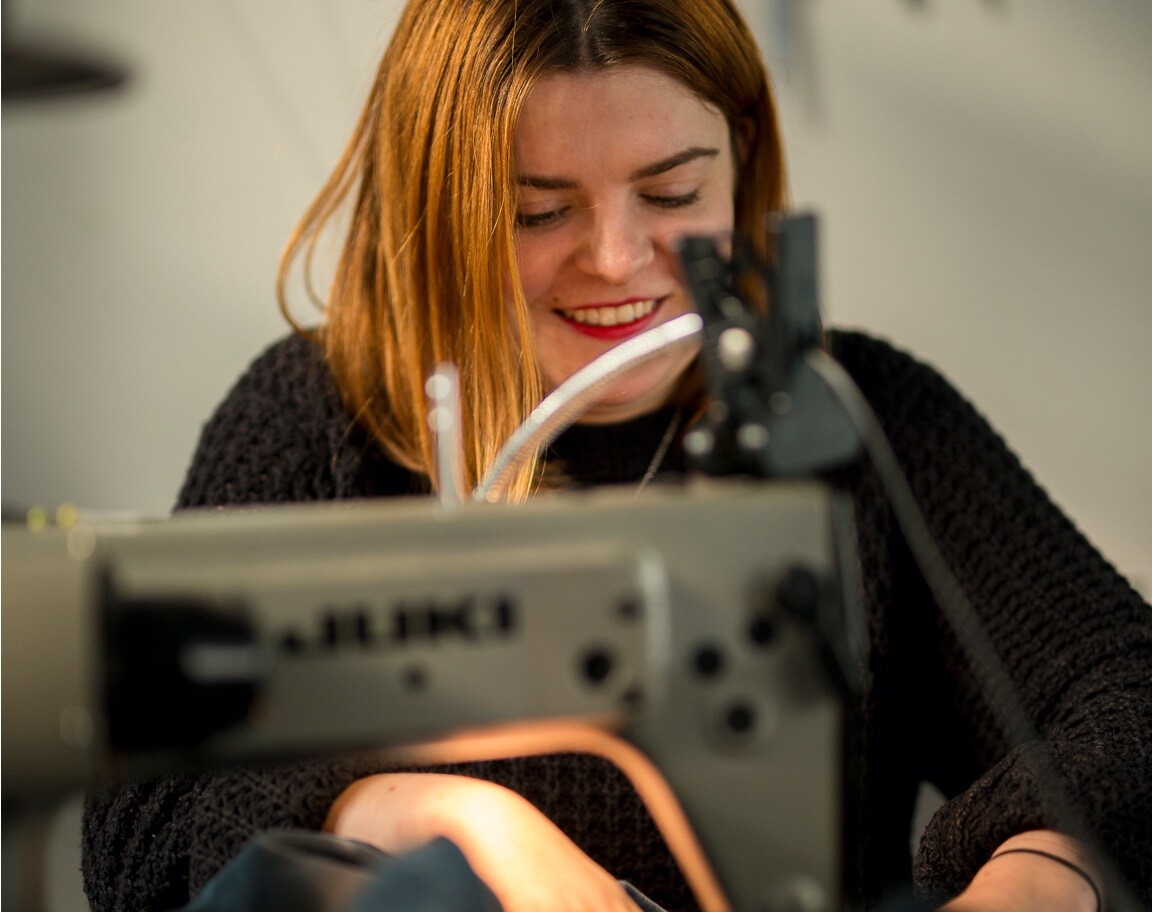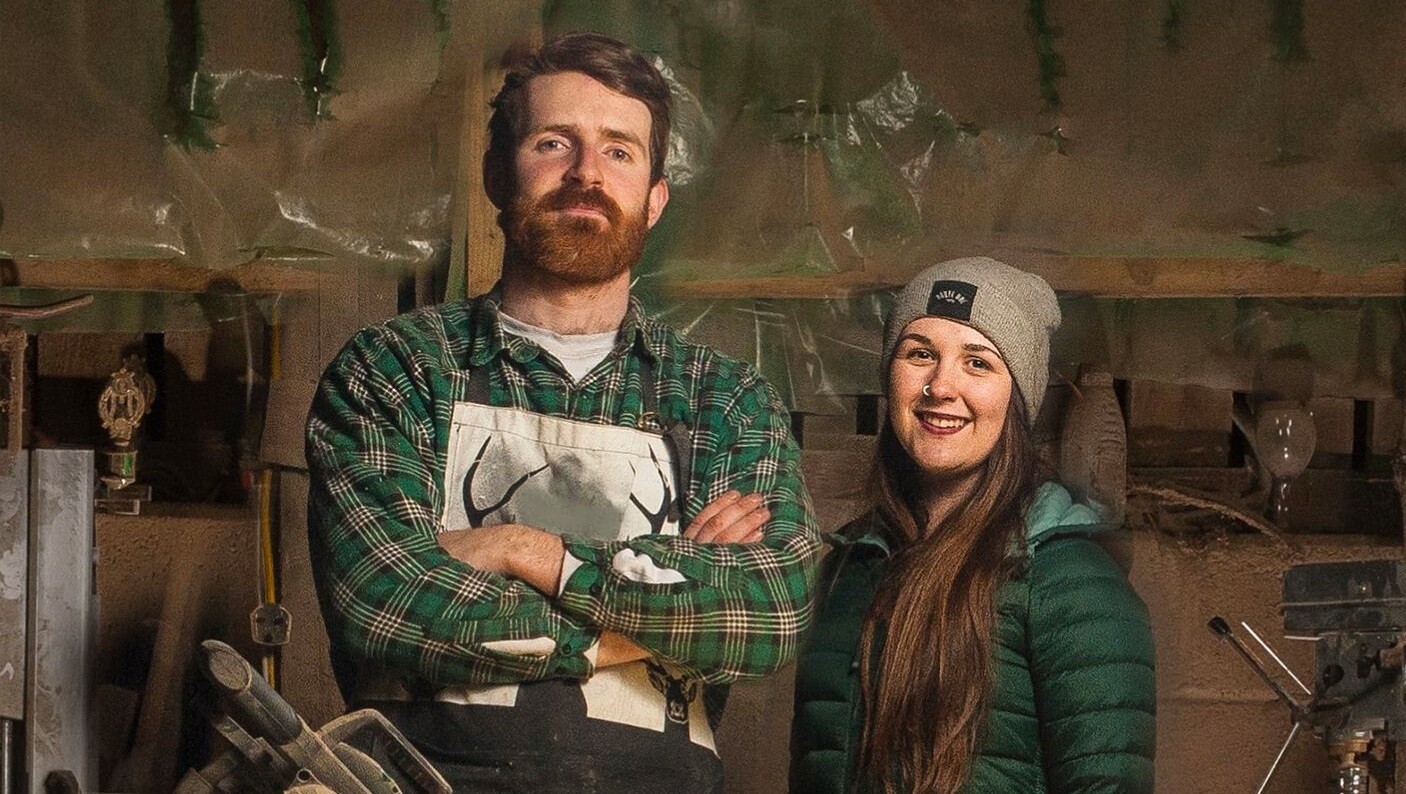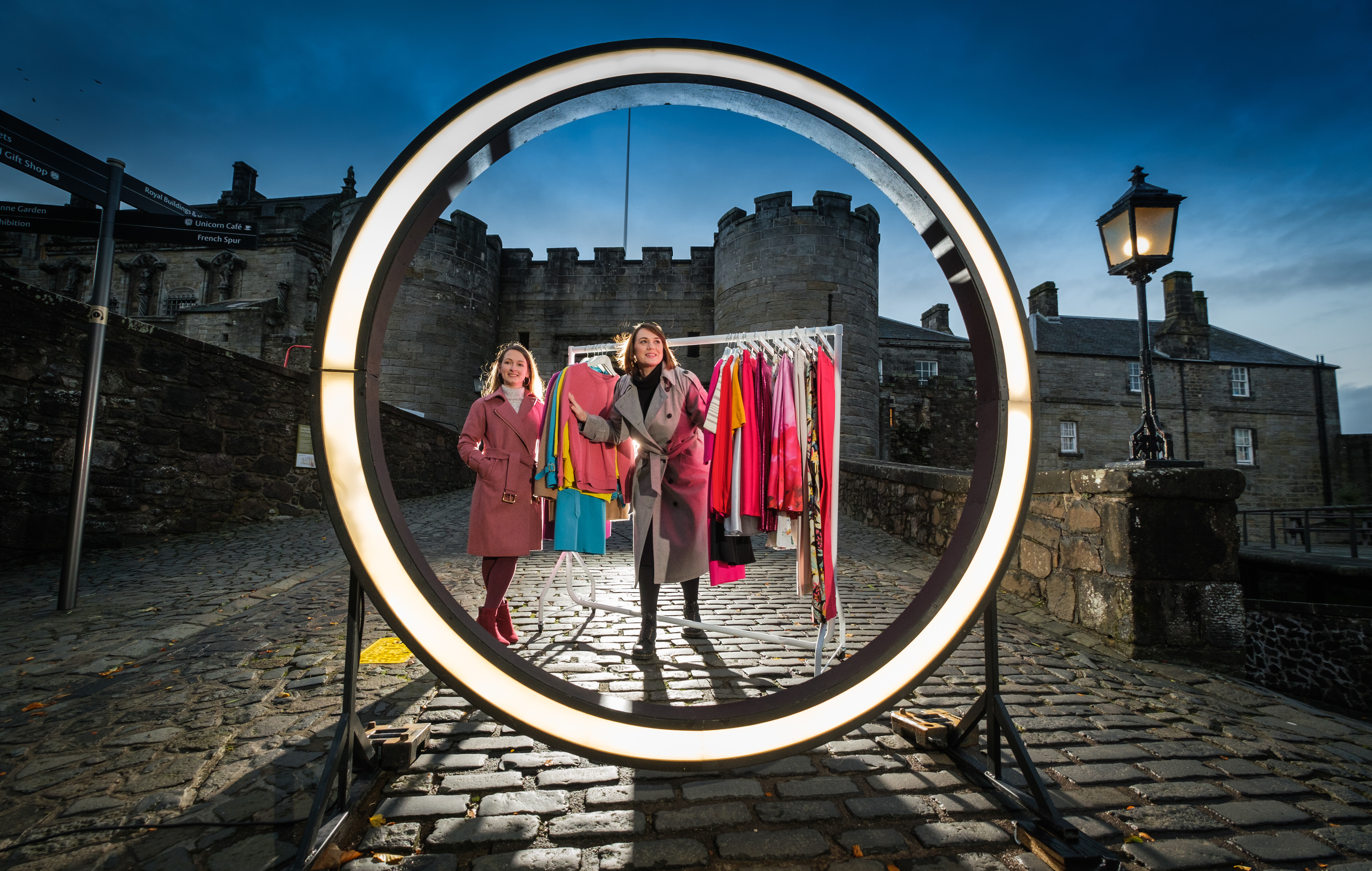Can sustainable fashion reduce Scotland's climate footprint?
“The main thing is don’t feel bad for buying fast fashion. If you do buy off the high street, don’t feel guilty, just keep that garment going for as long as possible. I’m not here to make people feel bad for their choices. Just whatever you do buy, please keep it going for as long as possible and then guilt-free,” says Siobhan McKenna, fashion designer and founder of sustainable fashion brand ReJean.
The comment might sound unusual, given her livelihood is based on selling garments, but McKenna is one of a growing number of people wanting to tackle the pressure fashion puts on the planet.
From production and manufacturing, to transport, right through to disposal, what we wear contributes around eight per cent of total global emissions. That’s more than aviation and shipping combined. And the UK is a significant contributor to the problem, with each person buying around 26.7kg of clothing every year (over 10kg more than the European average).
The slow fashion movement seeks to reduce this. The UN’s Fashion Industry Charter for Climate Change set a target to get the industry to net zero by 2050 and, in the UK, sustainability charity WRAP is working with industry to meet carbon, water and circular textile targets.
A raft of fashion firms, such as Asos and Primark, have announced new sustainability commitments and the APPG on Textiles and Fashion at Westminster, chaired by SNP MP Lisa Cameron, is looking to champion brands pursuing such goals so customers are encouraged to buy from them. Cameron is also working with industry and government on a ‘fit to trade’ licensing scheme which, alongside ensuring good employment practices, would also recognise eco-friendly approaches and sustainable production.
Meanwhile in Scotland, firms like McKenna’s look to find solutions on a smaller scale. Operating out of a workshop in Glasgow’s Barras, she says she wants to “show that you can make quite high-end, luxury, made-to-last” items with materials that already exist. She first became interested in slow fashion when working as a tailor at Levi’s in London.
 Siobhan McKenna at her workshop in the Barras, Glasgow | Credit: Tom Barr
Siobhan McKenna at her workshop in the Barras, Glasgow | Credit: Tom Barr
“I talked to people that really looked after their clothes. I called them denim-heads, people that wore these nice jeans and wash them as little as possible and got them repaired continuously, and really got as much life as they possibly could out of them. It’s the first time I met, or even came across, that sort of way of being,” she says. After a brief spell at vintage firm Rokit, she returned to Glasgow and launched ReJean on Instagram.
"I finally mustered up the courage and motivation to start working on my own little idea that was just buzzing away in my head. And for me at the time using second-hand denim was also just less of a risk, financially. I guess for the planet as well. I was just like, who am I to buy a load of fabric and make some stuff? I have no idea if anybody’s going to buy it, you know, that’s just a big risk.”
As well as the environmental impact, she’s also keenly aware of the social impacts of fashion – specifically, the working conditions and wages of the people who make a lot of our clothes. “A T-shirt for £2 doesn’t add up and it never will,” she says. “Fast fashion is taking the value out of clothing. And because it’s so cheap, people, their jaws really drop when they see something that’s priced fairly.”
A ReJean denim jacket will set you back £295. But asked about the accessibility of slow fashion, McKenna says it doesn’t have to be expensive. “The most sustainable garment is the one that’s already in your wardrobe. So, I would always start with what you already own. Either get stuff repaired, learn to repair it yourself, and shop second hand, vintage, charity.”
She offers denim repair as part of her business and she’s enthusiastic about getting others to give mending a go. “If you take the time to sew on a button, you’ve invested five minutes in that garment, instead of disposing of it. And so yeah, all these little acts of care for our clothing, you start to build an emotional relationship with it, you know, it has sentimental value in a way.”
Over in Perthshire, another small business also believes in reusing materials to create an emotional bond with our stuff. No Comply, rather unusually, turns old skateboards into jewellery.
 Andy Donaldson and Cat Carstairs work out of a workshop in Perthshire
Andy Donaldson and Cat Carstairs work out of a workshop in Perthshire
Co-founder Andy Donaldson explains: “From the get-go, we’ve always used reclaimed materials in our woodwork and it’s important to us that when we’re putting our pieces out into the world, that they’ve been made using resources that we already have. Skateboards themselves tell such incredible stories and have already endured a life of their own, creating memories in the streets and the skateparks. When we make one of our pieces from a broken board, we’re taking something that has its own history and get the chance to give it a new lease of life with the opportunity of creating more memories in its new form.”
Jewellery, like fashion, comes with a huge carbon footprint. As well as the manufacturing and transport costs, mining and associated deforestation have wreaked havoc in many developing countries for decades. Some areas will never recover.
Donaldson and his partner Cat Carstairs set up the company after experimenting with upcycling. Starting out with small pieces of jewellery, the pair now also produce homeware and kitchenware. “The idea has developed from a desire to create something from nothing and the concept of producing sustainable products through craft,” says Donaldson, adding: “There is access to such a wide variety of materials that can be recycled into every day useful items. You just need to want to find them.”
In Stirling, another innovative pair have chosen to tackle fashion and climate in a slightly different way. Naomi Ross and Alex McKenna set up clothing rental firm Sioda. It gives customers the feeling of having something new without having to pay the environmental price for it.
Ross explains: “We are targeting people who tend to be budget fashion brand buyers. They would maybe treat themselves once in a blue moon to something from Coast or Karen Millen if they’ve got a wedding to go to, but their standard wardrobe is Primark and H&M and possibly something nice from Next occasionally. It has been about saying to them, you know, sure, you can get something that’s all right from them that you maybe wear once or twice and probably is going to fall apart after that, or you’ll decide that actually it doesn’t suit you anymore, or you don’t like it after all. Or for that same price you can get an amazing high-quality luxury thing.”
 Naomi Ross and Alex McKenna took part in the Scottish Government's #LetsDoNetZero campaign
Naomi Ross and Alex McKenna took part in the Scottish Government's #LetsDoNetZero campaign
It comes with the added bonus of opening up the climate conversation in new ways. Ross, who worked in environmental policy and regulation for nine years before founding Sioda, says: “We’re not going to be able to get our way out of this climate crisis if we don’t bring everybody with us and I wanted to find a way to be able to do that… [We can] use [fashion] as a way to bring women into the conversation about sustainability in a way it was comfortable for them, that would excite them. It’s not talking about cyclists, its not talking about solar panels, it’s talking about some women do love.”
ReJean, No Comply and Sioda have all recognised the need to slow down consumption, a point Zero Waste Scotland (ZWS) is also keen to emphasise. Anna Graham, sector manager for business support, says: “Around four-fifths of Scotland’s footprint comes from the products and materials we manufacture, use and throw away. When it comes to everything we consume – from flights to food and fashion to furnishings – buying and wasting less will help to reduce our carbon footprint.”
The bottom line, she says, is consumption is “unsustainable high”, but consumers looking to do their bit for the planet need only to make minor changes. “Slow fashion can be as simple as keeping clothes in use for longer by looking after them, washing at lower temperatures, washing less often, repairing, and drying naturally. Anything we can do to keep our clothes lasting for longer will greatly benefit the planet,” she explains.
ZWS is supporting the Scottish Government on the forthcoming (and long-awaited) Circular Economy Bill. But what does the circular economy actually mean?
Expert Lynn Wilson explains: “In the last 10 years the circular economy has become full of jargon, and actually when we look at it, it’s just about circulating. Circulating stuff that’s already been manufactured, produced, consumed, but still has life.”
Wilson, who worked for ZWS before launching a consultancy firm specialising in fashion sustainability, coined the term circular economy wardrobe. This is about “how we maximise what we have, how we keep it in use and how we share it, and then how we look after it, how we give our clothing longevity through repair, through maintenance in the home.” Essentially, can we ensure getting maximum wear of every item of clothing in our household by sharing between family members, repairing when we can and reducing demand for new items.
But beyond individual habits, Wilson also says it’s important to consider the wider lifecycle of our clothes. “When we’ve done all that and we have kept something in use for as long as possible, we’ve maintained it, and at the end of the day there is nothing else we can do with it… what can we do? At that stage, what is the partnership between the commercial side, the industrial side and the local authority?”
This might simply be about making textile recycling bins locally available or having stores operate take-back schemes, but it could also be used to help tackle inequalities within communities by getting items to those who need them or working with industry to reprocess fibres into brand-new items.
This type of model is being tested elsewhere in the UK. Oxfam’s Wastesaver site in Yorkshire already prevents 12,000 tonnes of clothing going to landfill per year by distributing them for resale. Building on the success of that, the charity is now partnering with the recycling sector to consider what can be done with items that cannot be sold. The charity’s trading director, Lorna Fallon, says: “That feels like a real step change for us, and so we’re continuing looking at every single item that comes over our threshold, looking at, what can we do? How can we recycle? And who do we partner with? It’s not all about doing everything ourselves, it’s partnering with the right people.”
Oxfam has 580 shops across the UK and is keen to encourage people to buy second-hand. While attitudes around buying from charity shops have shifted in the last few years, Fallon accepts there is still more to be done. “We have to have a conversation in the charity retail industry about how we, all of us, can engage more people and actually shout that we are the original recyclers.”
Fallon believes the pandemic has helped, by encouraging people to think about their lifestyle choices, as has the microscope placed on both climate change and exploitation of workers.
But Wilson is more sceptical and says charity shops still have a long way to go before they can compete with the high street. She says: “It should be boutique shopping. It should look like a fashion offer. It needs to compete and the charity sector is not competing. Until it does, we’re going to continue with this stigma. We need to make second-hand the automatic choice.”
Ultimately, the way to slow down fast fashion is to make it easier and cheaper for consumers to embrace the three Rs – reduce demand for new items, reuse clothing as much as possible before putting it in the bin and recycling when the item is totally worn out.
“It all starts, I think, with just picking pieces, picking items of clothing that you actually genuinely love, because then we will wear them more,” Fallon says.
Holyrood Newsletters
Holyrood provides comprehensive coverage of Scottish politics, offering award-winning reporting and analysis: Subscribe